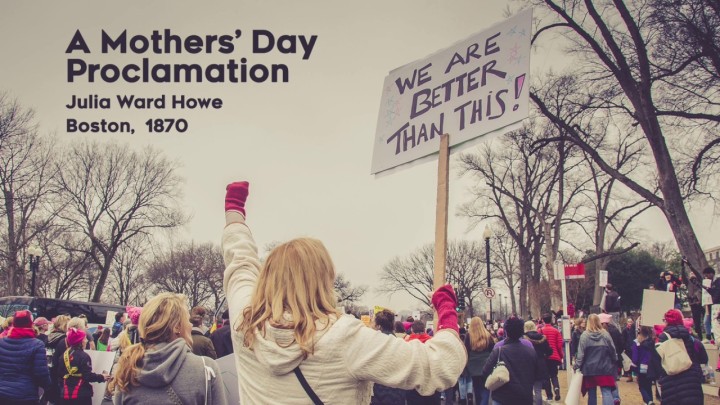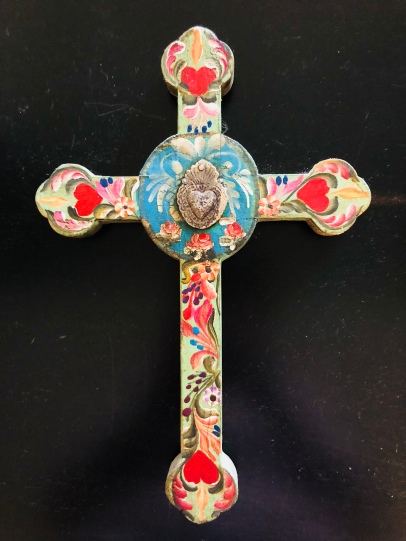Over the years, I’ve often shared what my Mother’s Days were like, how my hopes were met or dashed, based on the performance of my kids and husband. I am a slightly abashed to read those vignettes now, at the neediness they reveal, though they also make me smile. But this year, I had few hopes for Mother’s Day, besides waking up in my own bed. (I’ve been traveling way too much lately.) Mission accomplished! Instead of having my coffee and a pink donut delivered to my bedside, I got my own darn coffee and it was a delightful way to start the day.
At church on Sunday night, I was reminded how our modern Mother’s Day has so little to do with the first speech that inspired it. The original “Mother’s Day Proclamation” of 1870 was written as a protest against war, and a reminder that if women were in charge, things would be run a little differently in our nation and around the world. It reads in part:
… In this day of progress, in this century of light, the ambition of rulers has been allowed to barter the dear interests of domestic life for the bloody exchanges of the battle field. Thus men have done. Thus men will do. But women need no longer be made a party to proceedings which fill the globe with grief and horror. Despite the assumptions of physical force, the mother has a sacred and commanding word to say to the sons who owe their life to her suffering. That word should now be heard, and answered to as never before
Arise, then, Christian women of this day! Arise, all women who have hearts, whether your baptism be that of water or of tears! Say firmly: We will not have great questions decided by irrelevant agencies. Our husbands shall not come to us, reeking with carnage, for caresses and applause. Our sons shall not be taken from us to unlearn all that we have been able to teach them of charity, mercy and patience. We, women of one country, will be too tender of those of another country, to allow our sons to be trained to injure theirs. From the bosom of the devastated earth a voice goes up with our own. It says: Disarm, disarm! The sword of murder is not the balance of justice. Blood does not wipe out dishonor, nor violence vindicate possession. As men have often forsaken the plough and the anvil at the summons of war, let women now leave all that may be left of home for a great and earnest day of council.
Let them meet first, as women, to bewail and commemorate the dead. Let them then solemnly take council with each other as to the means whereby the great human family can live in peace, man as the brother of man, each bearing after his own kind the sacred impress, not of Caesar, but of God…
Preach, Julia Ward Howe!
I just wish we had heeded her call more effectively. Peace protests have happened and anti-war movements have had their day. MADD has significantly curbed the violence of drunk driving and Moms Demand Action is making inroads for common sense gun control, but there are still many places where women’s voices are not, and presumably never will be heard.
One of them is a place I have held near and dear to my heart, the Roman Catholic Church, where you will not hear a female voice. Not in leadership, (except to other women, and always under the “authority” of men), not preaching during mass, not speaking for the church at large, not making decisions, or even having more than a minority stake in any decision-making process. Though it was totally normalized in my childhood, I simply cannot wrap my head around it any more. I look at my daughters, my nieces, and their friends and I can’t imagine them being silenced and disenfranchised. I’d like to think my son and his peers wouldn’t allow it either, which is why I was so disappointed in the recent public discussions about the diaconate for women.
Last week, Pope Francis responded to the reports from a committee he had commissioned to study the history of women’s diaconate in the early church. While they affirmed that women were certainly ordained, they could not agree on “what kind” of diaconate it was.
“There were deaconesses at the beginning [of the church], but [the question is] was theirs a sacramental ordination or not? … There is no certainty that theirs was an ordination with the same formula and the same finality of the male ordination.”
With those words, Francis affirmed again that women must continue to be patient, that more study could be done (with no indication that it would be) and that Divine Revelation would surely continue. In the meantime, he assured the public (I imagine, specifically, the nervous among the all-male clergy), men will continue to be in charge and run things as they see fit, paying little attention to the voices of women.
I’m sure Julia Ward Howe shares my frustration, but she’s not the only one. From the same pulpit, I also heard a powerful response to Francis’ position, written by a group of Irish priests, for whom I am deeply grateful. I consider it a Mother’s Day Proclamation for 2019.
Pope Francis’s comments on women deacons at the press conference on the plane back from Bulgaria, his kicking the can down a timeless road, is a major disappointment. We had come to expect reactions like this from previous popes, but we thought Francis was different, and consequently our disappointment is greater.
The equality of women is critical for the credibility and the future of the Church. Introducing women deacons is such a minimalist step that if he cannot move on that, there is little or no prospect of any real movement towards equality.
His comments send all the wrong messages about women to women and men.
It confirms that women are not good enough, and that in the eyes of the ‘official’ Church men are more worthy than women.
It confirms that many of women’s gifts will continue to be wasted.
It confirms that the official institutional Church is a men’s Church.
It confirms that to be a full member of the Church, exercising all the privileges, you have to be a man.
It confirms that the Church is a structure built by men for men.
It confirms that the Church continues to be a clerical hierarchical patriarchy.
It confirms that injustice is built into the heart of the Church.
This is an enormous blow to reforming the Church and bringing it into the 21st century.
Now is the time for all of us who believe in equality to make our voices heard, clearly and without equivocation. There must be no fudge about where we stand; bishops, priests and people in the pews. Now is not the time for looking over our shoulders, thinking of our chances of promotion, or of offending those in authority. This is much too important.
If you aren’t “into” church, church history, or church politics, you might run right past this post, but if you are “into” women: raising them, teaching them, loving them, partnering and working with them, then I hope you’ll understand how important this subject is.
How the Roman Catholic church, (and Christian churches in general) treat women has a huge impact on how women are treated around the world.
They could do so much better. I have no doubt that God wants them to do better. We would all be better off. And that’s what I really want each and every day – for mothers and for women everywhere.
When my kids were small, Mother’s Day felt like it needed to be all about me, because my daily life seemed so little about me. But every day now, I spend some time alone. I wake when I decide; I go to bed when I’m ready. I cook what I like to eat; I spend time with people – in places I want to be. I work at things I love. All those things were less true to some degree for the last twenty years and so it feels like a turning point. It went from a day when I wanted gratitude to a day when I am overwhelmed with it.



































